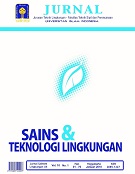Main Article Content
Abstract
Abstract
Solid waste reduction and handling efforts require full community participation. Governments and stakeholders continue to improve solid waste reduction and handling. From 71 million tons of waste was produced, it was only capable of carrying out waste reduction of 6.5 million tons (10%) in 2015. The 3 R movement also has not shown significant result, it was only 7.5% of waste that is processed into compost and recycle, 10% still in the grave in the ground, 5% was burned, and 8.5% unmanaged. As much as 69% of the total waste was dumped into the waste landfill. For that we need an assessment the driving factors of sustainability of community-based solid waste management. This paper aims to analyze the driving factors of sustainability community-based solid waste management in the cities of Bogor and Balikpapan. The approach used in the form of qualitative research methods through the process of description, tendency, and interpretation. The results showed that there are 6 (six) driving factors that play a major role in the sustainability of community-based solid waste management in the cities of Bogor and Balikpapan. The driving factors include the role of community leaders, economic benefits, social benefits, environmental benefits, the management network, and the stimulation and facilitation of local government.Â
Keywords: driving, sustainability, domestic waste, and community participationKeywords
Article Details
Authors who publish with this journal agree to the following terms:
- Authors retain copyright and grant the journal right of first publication with the work simultaneously licensed under a Creative Commons Attribution License that allows others to share the work with an acknowledgement of the work's authorship and initial publication in this journal.
- Authors are able to enter into separate, additional contractual arrangements for the non-exclusive distribution of the journal's published version of the work (e.g., post it to an institutional repository or publish it in a book), with an acknowledgement of its initial publication in this journal.
- Authors are permitted and encouraged to post their work online (e.g., in institutional repositories or on their website) prior to and during the submission process, as it can lead to productive exchanges, as well as earlier and greater citation of published work (See The Effect of Open Access).
References
- Direktorat PPLP, Kementerian PU 2012. Pedoman Umum Penyelenggaraan TPS 3R Berbasis Masyarakat.
- Direktorat PPLP, Kementerian PU 2013. Paparan Monitoring dan Evaluasi Kegiatan 3 R
- Hapsari, Nindy, 2014. Evaluasi Program Pengelolaan Sampah Berskala Keluarga di Kelurahan Tembalang. Jurnal Teknik PWK Vol 3 No 1 2014 hal 155 – 166
- Kholil dkk, 2008. Pengembangan Model Kelembagaan Pengelola Sampah Kota dengan Metode ISM (Interpretative Structural Modelling) : Studi Kasus di Jakarta Selatan. Sodality : Jurnal Transdisiplin Sosiologi, Komunikasi, dan Ekologi Manusia, April 2008 hal 31 – 48
- Leksono, Bowo 2009. Tindak Lanjut Undang-Undang Persampahan. Majalah Percik Edisi Mei 2009
- Mungkasa, Oscar 2009. Pemberdayaan Masyarakat dalam Pengelolaan Sampah. Majalah Percik Edisi Mei 2009
- Sidiq, Solihin, 2009. Implementasi Peran Masyarakat Sesuai UU No. 18 Tahun 2008. Majalah Percik Edisi Mei 2009
- Tchobanoglous, G., Theisen, H., & Vigil, S. 1993. Integrated Solid Waste Management. New York: McGraw-Hill, inc.
- Utami, Beta Dwi dkk, 2008. Pengelolaan Sampah Rumah Tangga Berbasis Komunitas : Teladan Dari Dua Komunitas di Sleman dan Jakarta Selatan. Sodality : Jurnal Transdisiplin Sosiologi, Komunikasi, dan Ekologi Manusia, April 2008 hal 49 – 68
References
Direktorat PPLP, Kementerian PU 2012. Pedoman Umum Penyelenggaraan TPS 3R Berbasis Masyarakat.
Direktorat PPLP, Kementerian PU 2013. Paparan Monitoring dan Evaluasi Kegiatan 3 R
Hapsari, Nindy, 2014. Evaluasi Program Pengelolaan Sampah Berskala Keluarga di Kelurahan Tembalang. Jurnal Teknik PWK Vol 3 No 1 2014 hal 155 – 166
Kholil dkk, 2008. Pengembangan Model Kelembagaan Pengelola Sampah Kota dengan Metode ISM (Interpretative Structural Modelling) : Studi Kasus di Jakarta Selatan. Sodality : Jurnal Transdisiplin Sosiologi, Komunikasi, dan Ekologi Manusia, April 2008 hal 31 – 48
Leksono, Bowo 2009. Tindak Lanjut Undang-Undang Persampahan. Majalah Percik Edisi Mei 2009
Mungkasa, Oscar 2009. Pemberdayaan Masyarakat dalam Pengelolaan Sampah. Majalah Percik Edisi Mei 2009
Sidiq, Solihin, 2009. Implementasi Peran Masyarakat Sesuai UU No. 18 Tahun 2008. Majalah Percik Edisi Mei 2009
Tchobanoglous, G., Theisen, H., & Vigil, S. 1993. Integrated Solid Waste Management. New York: McGraw-Hill, inc.
Utami, Beta Dwi dkk, 2008. Pengelolaan Sampah Rumah Tangga Berbasis Komunitas : Teladan Dari Dua Komunitas di Sleman dan Jakarta Selatan. Sodality : Jurnal Transdisiplin Sosiologi, Komunikasi, dan Ekologi Manusia, April 2008 hal 49 – 68
